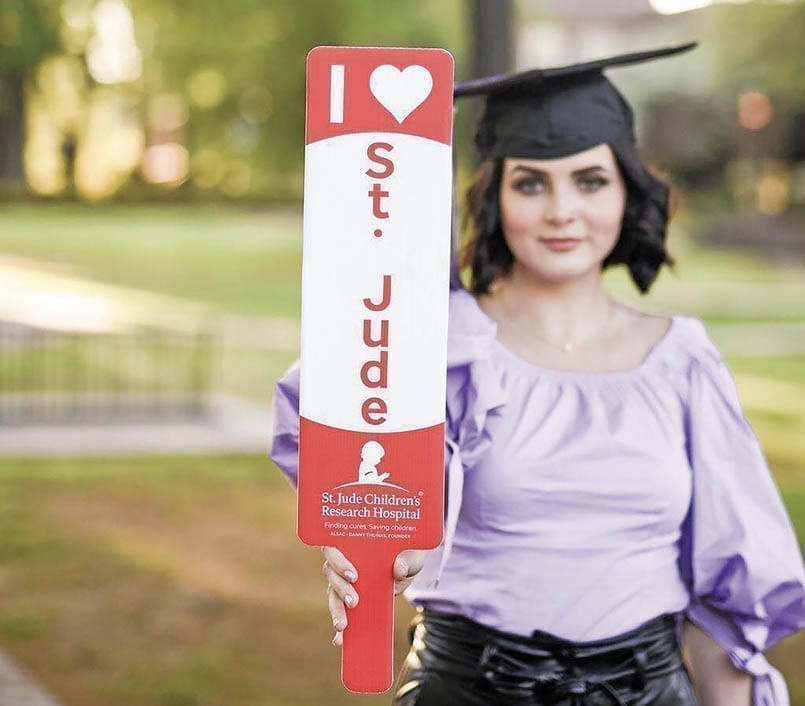26 Apr 2020 Class of COVID-19: UCA student adjusts to new normal
by Jennifer Godwin
There are no guarantees in life, even when at 18 and seemingly invincible, you think the world is your oyster; not even at 21, when you have a college degree nearly in hand, and you feel ready to rule the world.
Like the estimated 4.5 million other college students in the United States whose senior year was cut short, Madison Conklin is adjusting to a new normal as a part of the Class of 2020, now known as the Class of COVID-19.
This disruption isn’t entirely new territory for Madison, whose college years have now been bookended by two pivotal events. The first one, cancer, taught her that she could withstand any storm in her path. The second, the coronavirus pandemic that has brought much of the world to its knees, is the storm that is testing Conklin in new ways.
Shocking diagnosis
In the fall of 2016, Madison was returning for her fall semester at college in East Tennessee when she discovered a golf-ball sized lump in her neck. She didn’t think much of it at first, because she had been sick off and on that year, first with mono and then with stomach issues, both of which she chalked up to stress.
Eight hours from her family in west Tennessee, Madison had her roommate, a nursing major, take her to the hospital. What came next was a flurry of tests. Bloodwork indicated something was amiss, and a CT scan confirmed that it wasn’t stress or mono. A biopsy then revealed a shocking diagnosis: Hodgkin’s lymphoma.
Rattled but resilient, Madison kept her composure as her college friends broke down in tears upon hearing the news.
“I was just thinking to myself, ‘What are my next steps? I need to call my professors and let them know what’s going on.’ I was in planning mode,” she recalls.
Madison called her parents, and upon the recommendation from her doctors, she came to St. Jude Children’s Research Hospital in Memphis for her care and treatment, which would come to include four rounds of chemotherapy as well as physical and occupational therapy.
Madison’s family was familiar with St. Jude. Her father’s sister was a patient there at 16 in the 1980s. So she knew she was in the best hands possible.

A new path
In February 2017, just four months after finding the lump in her neck, Madison’s treatment was completed. She had plans to return to school but needed to find a university closer to St. Jude so she could keep her regular appointments.
In the fall of that year, Madison became a University of Central Arkansas Bear, majoring in fine arts.
In Conway, Madison was able to turn a new page. She loved the small-town feel, how relaxed everything was. Being at UCA gave her a sense of normalcy and a security she hadn’t felt since before her cancer diagnosis.
“My UCA professors and friends went above and beyond to help me out,” she said. “They embraced my quirks.”
Madison took a position at the student-run campus art gallery and bonded with fellow art majors. She had found her second home at UCA.
She even held an art-themed event for St. Jude, her other second home.
The world stops
Madison had just finished her senior project and was on pace to graduate on time in 2020, without skipping a beat in her college career.
Then March 12 happened. It would be the abrupt end to the school year, with the UCA campus closed and no commencement ceremony for its seniors.
“My one big goal [after cancer] was to receive my college degree,” Madison said. “It’s meaningful for many reasons, but especially because I am the first person in my family to graduate from college.”
UCA still plans to recognize its graduating seniors, only now with a video message from President Houston Davis and congratulatory messages from the provost and deans.
But for Madison and the others, it will mean no ceremony, no standing in front of families cheering them on, no pomp and circumstance and no moving of the tassel or throwing of the mortar board at the end. In fact, she hadn’t yet received her graduation attire, so the senior photos she took were in a cap and gown borrowed from a 2019 graduate, with the wrong year on the tassel slyly hidden.
Still, with all that she and the other college seniors are missing, Madison considers herself fortunate.
While she doesn’t know what is in store for her future, she knows that she has come through the challenge of cancer a stronger person with a clear perspective on life, that and a dog named Jude, who no doubt helped inspire her senior project, Pairing Animals with Humans (PAWH). Madison may not get to have a real graduation or her senior art show, but COVID-19 or not, she got the opportunity to merge her passion with her purpose, leaving her mark on the world.










